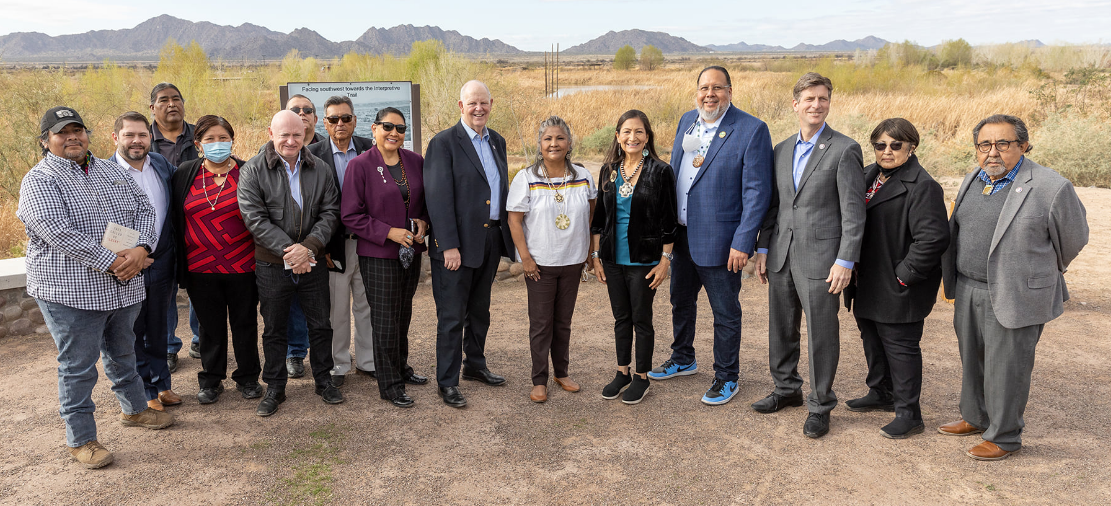
- Details
- By Native News Online Staff
The U.S. Department of the Interior announced on Tuesday the allocation of $1.7 billion of Infrastructure Law funding this year to enacted settlements that have outstanding federal payments necessary to complete their terms.
The announcement came one day after Interior Secretary Deb Haaland (Laguna Pueblo) visited Phoenix week to underscore the Department of the Interior’s commitment to Indian Country and the historic investments from President Biden’s Bipartisan Infrastructure Law to address the Western water crisis.
Want more Native News? Get the free daily newsletter today.
On Monday, Secretary Haaland and Congressman Tom O'Halleran (D-AZ) held a listening session with the Inter-Tribal Council of Arizona. While there, Haaland heard from tribal leaders about the issues impacting local communities, including the climate crisis and the ongoing water crisis facing the West.
"Water is a sacred resource, and water rights are crucial to ensuring the health, safety and empowerment of Tribal communities. With this crucial funding from President Biden’s Bipartisan Infrastructure Law, the Interior Department will be able to uphold our trust responsibilities and ensure that Tribal communities receive the water resources they have long been promised,” said Secretary Haaland. “I am grateful that Tribes, some of whom have been waiting for this funding for decades, are finally getting the resources they are owed.”
Rep. Raúl M. Grijalva (D-Ariz.), who chairs the House Natural Resources Committee, praised the announcement.
"Today’s announcement is a long-awaited moment in history, and I celebrate it proudly,” Chair Grijalva said. “Too many tribal communities have been waiting years—even decades—to finally have access to the water they’ve been promised by the federal government. I commend Secretary Haaland for her leadership in fulfilling our trust responsibility and for recognizing the devastation that two decades of drought has caused in Arizona and the southwest. At the same time, I know these investments only solve part of the problem. Congress must get back to work to pass permanent annual funding for the many tribal water rights settlements that still have yet to be paid.”
Secretary Haaland highlighted the transformational Bipartisan Infrastructure Law, which is delivering $13 billion to Indian Country, including $216 million for climate resilience programs and $250 million to support water and health infrastructure. These critical investments will help bolster community resilience, replace aging infrastructure, expand access to clean drinking water, and ensure that everyone has access to high-speed internet.
On Tuesday, Secretary Haaland, Senator Mark Kelly, Chairman Raúl Grijalva, Congressmen O'Halleran, Greg Stanton, and Ruben Gallego visited the Gila River Indian Community to highlight today’s announcement that Interior will allocate $1.7 billion of Infrastructure Law funding this year to fulfill settlements of Indian water rights.
Working in consultation with Tribes, this funding will help deliver long-promised water resources to Tribal communities, certainty to all their non-Indian neighbors, and a solid foundation for future economic development for entire communities dependent on common water resources.
Later, Secretary Haaland, Senator Kyrsten Sinema, Congressmen O'Halleran and Stanton, and Phoenix Mayor Kate Gallego visited the Salt River to highlight the Urban Waters Federal Partnership and the work of the Rio Salado Project that is helping protect, restore and revitalize the Salt and Middle Gila River Watershed.
More Stories Like This
Native News Weekly (August 25, 2024): D.C. BriefsUS Presidents in Their Own Words Concerning American Indians
Native News Weekly (December 14, 2025): D.C. Briefs
Wounded Knee Massacre Site Protection Bill Passes Congress
Two Murdered on Colville Indian Reservation
Help us defend tribal sovereignty.
At Native News Online, our mission is rooted in telling the stories that strengthen sovereignty and uplift Indigenous voices — not just at year’s end, but every single day.
Because of your generosity last year, we were able to keep our reporters on the ground in tribal communities, at national gatherings and in the halls of Congress — covering the issues that matter most to Indian Country: sovereignty, culture, education, health and economic opportunity.
That support sustained us through a tough year in 2025. Now, as we look to the year ahead, we need your help right now to ensure warrior journalism remains strong — reporting that defends tribal sovereignty, amplifies Native truth, and holds power accountable.
 The stakes couldn't be higher. Your support keeps Native voices heard, Native stories told and Native sovereignty defended.
The stakes couldn't be higher. Your support keeps Native voices heard, Native stories told and Native sovereignty defended.
Stand with Warrior Journalism today.
Levi Rickert (Potawatomi), Editor & Publisher

